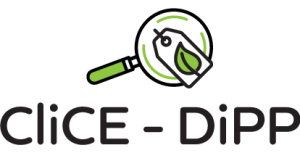The Climate Protection Act has enshrined greenhouse gas neutrality for Germany by 2045. Emissions are to be reduced by 65 percent by 2030 compared with 1990. There is a great need for action here, especially for industry. However, in many companies there is little knowledge of which emissions are generated along the entire value chain, especially outside their own company. In addition, the EU’s ESG (Environmental, Social, Governance) requirements call for transparency in data use and resource utilization in the future. In order to create the required transparency of energy consumption and CO2 emissions and to collect information on resource consumption along the entire value chain, CliCE-DiPP will develop a digital product passport.
Objective
Greenhouse gases are mainly responsible for the ongoing change in the global climate. In Germany, as in many countries around the world, there are therefore requirements to reduce CO2 emissions, for example via the Paris Agreement. One of the largest sources of CO2 emissions is industry. To achieve the climate targets, industry must therefore drastically reduce its greenhouse gas emissions. Against this background, it can be assumed that in the future only products with a low CO2 footprint (“Product Carbon Footprint”, PCF) will be considered competitive. It is particularly important that greenhouse gas emissions from the entire value chain are made transparent – including all expenses, such as those for transport. Only in this way is it possible to consider and optimize the entire product life cycle.
| Project Runtime | 05/2023 – 04/2026 |
| Funding Body | Federal Ministry for Economic Affairs and Climate Action (BMWK) |
| Involved Partners | 13 Partners and 9 Associated Partners from Germany |
| My Role | Project Leader / Deputy Project Coordinator |
| My Project Participation | Since 05/2023 |
| Major Development |
Goals
CliCE-DiPP will develop a digital CO2 product passport that contains all relevant sustainability and energy data across companies, using the example of the metalworking industry and measuring equipment sector. The digital product passport will not only provide information about the respective product-specific CO2 footprint (PCF), but will also enable the optimization of the production process from the point of view of energy and resource consumption – throughout the entire value chain.
Solution
A digital product passport is being developed to create the necessary transparency of energy consumption and CO2 emissions and to collect information on resource consumption throughout the value chain. It is intended to provide companies with a point of reference for general process optimization. The data exchange required for this takes place, for example, via OPC UA interfaces (i.e., via the “Unified Architecture” specification of the “Open Platform Communications” standard). The data is then stored in the administration shell/asset administration shell, which provides a standardized framework for the exchange and provision of information.
Assistance systems help employees manage overall energy-efficient asset effectiveness. For energy- and resource-efficient store floor management (SFM), demonstrators are first piloted and validated in the learning factories of the scientific institutes and then transferred to real application scenarios at the application companies.
Project website: https://clice-dipp.de.

